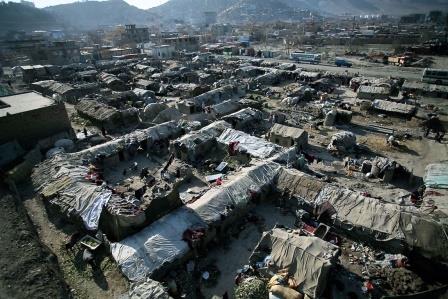The United Nations Special Rapporteur on the human rights of internally displaced persons (IDPs), Chaloka Beyani, today made an appeal to the international community to achieve durable solutions for internally displaced persons living in urban settings.
“Transitional solutions for IDPs in urban areas are too often mistaken for durable solutions,” Mr. Beyani told the UN General Assembly during the presentation of his report on protection of and assistance to internally displaced persons. “A comprehensive understanding of the durable solutions framework, that embraces the broader context of vulnerability or poverty and displacement-affected communities, is vital.”
The human rights expert warned that “the lack of land tenure security, extinct tenancy agreements and the absence of other forms of user rights expose internally displaced persons to the risk of forced evictions and therefore to secondary displacement, which greatly hampers the possibility of durable solutions.”
IDPs in informal urban settlements typically live in makeshift, unprotected shelters, and internally displaced women tend to be more exposed to the risk of sexual and gender-based violence. IDPs in urban settings face further protection risks posed by unequal and discriminatory access to education, health services or employment, frequently heightened by the lack of individual documentation.
“Much more needs to be done in support of durable solutions for urban IDPs in a more comprehensive and coordinated manner,” Mr. Beyani stressed. “It is high time for States and authorities at all levels, development and humanitarian actors, urban planners as well as donors to address durable solutions for IDPs in urban settings as a matter of priority.”
The Special Rapporteur urged States affected by displacement to develop national frameworks, structures and policies on internal displacement and ensure that durable solution options are included in these frameworks. National and local authorities, he noted, should establish integrated planning guided by displacement dynamics, and ensure that urban development and upgrading plans, as well as poverty reduction plans, include aspects specific to internal displacement and settlements.
“Authorities at all levels must ensure full participation of IDPs in processes that address durable solutions for them and undertake large scale consultation with communities and neighbourhoods to address their broader concerns,” the independent expert stated.
“Donor States should devote part of their funding to profiling exercises in both conflict-affected and natural disaster-affected urban areas, so as to better grasp the complexity of achieving durable solutions for IDPs in urban settings,” Mr. Beyani concluded, while strongly encouraging them to allocate sufficient funding to respond effectively and sustainably to internal displacement in urban contexts.
| Themes |
| • Advocacy • Basic services • Displaced • ESC rights • Human rights • International • Land rights • Norms and standards • SDGs&MDGs • Urban planning |














